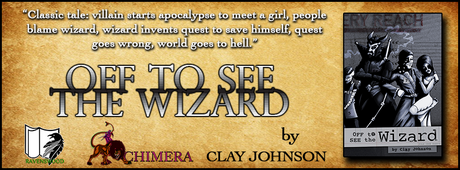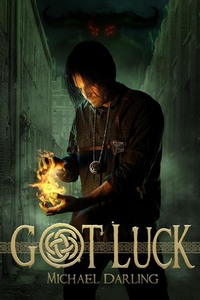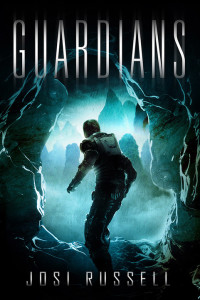
Welcome to Part Three of our participation in the Off to See the Wizard Book Tour (see Parts One and Two) — a review should be along shortly. We’ve got another Guest Post from the author, this time about the genesis of the book.
—
When I initially sat down to write one of these origins of the book, where did the story come from kind of posts, I went through three or four false starts. I kept focusing on the why, until I realized how boring that is. I mean, no matter how special I might have thought it was, the little thought that spawned the thing, the reality is very different, and I’m pretty sure that for every parody or humor piece that goes to any effort to skewer elements of its particular genre, the origin is the same: a healthy mix of love for the conventions of that genre, and an irritation at those same conventions. Either that, or a love for half the conventions and an irritation at the others. In both cases, writing about how those feelings led to writing the story eventually devolves into nothing more than a complaint session.
The more interesting, when I really got into it, was the how. How did I decide to tell the story, and why tell it that way. Sure, the story started as a vague idea about specific things I wanted to both poke fun at and pay homage to, but it didn’t truly come into being until I realized how I wanted to tell it. And that comes down to farce and writers workshops.
But first: there is a book by Tim O’Brien called Tomcat in Love (don’t worry, it’ll work its way back around). It belongs to that peculiar genre subsection of General Fiction/literary fiction where a middle aged white male college professor goes through a period of crisis and/or ennui (of the sort that can only be described as the epitome of first world problems) and the audience is put in the position of sympathizing with this character. He’s recently divorced, is in a romantic relationship with a student, can’t get the girl of his dreams to pay attention to him, and he’s taking his weekends to plot comic revenge against the man who stole his wife.
I know, I know, my novel is Fantasy and quest based. Like I said, I’ll work back around.
In that long circuitous route our brains sometimes take this way and that and over the hill to Grandma’s house in order to make connections (as I was taking a walk and letting Galbraith’s voice run through my head and explain why he started the whole quest), I remembered a workshop I’d been in one time where we did a set of questions in order to pinpoint our own writing style. Or maybe more accurately our own writing aesthetic. It was one of those exercises that didn’t land with me in any meaningful way at the time. Writers workshops seem to walk a very fine line between very useful and the type of obnoxious self help infomercial that airs at six AM and has bad piano music and graphics templates composited over stick footage of clouds at sunrise. In this case the exercise wasn’t particularly useful, in that it didn’t change my writing style, but it was interesting. According to the questionnaire, I like stories with characters that are their own worst enemy, stories with unreliable narrators, and I like farce. The third one I knew, but I hadn’t really connected to the other two.
Because really, one of the keys in a lot of farcical plots is that while the characters are often each acting in their own self interest, they are rarely acting in a way that is actually beneficial to themselves. It’s similar to the way that characters inn a romantic comedy could solve everything by simply having a conversation.
Now, in farces, you have a broad cast of characters all zipping in this door and out that window as the cook tries to steal a prize turkey, and the chauffeur tries to hide the damage to the car, while the visiting gentleman tries to win the affection sir who’s-his-what’s-its daughter. And on and on. One of my favorite elements of a good farce is that you can see some developments coming a mile a way and look forward to their arrival, and the others catch you completely by surprise. All because the individual characters have their own plots.
Also, because they are often all idiots.
Now, back to Tomcat in Love, for a moment. The narrator is an idiot. But you don’t know that at first. You also don’t know that he’s a degenerate and a coward. Tim O’Brien does an amazing job of making you sympathize with the character and like him and think he got the short end of the stick. You root for him and cheer him on, until about two-thirds of the way through. Then, through a series of small clues you start to get an inkling that the narrator may have been telling you a very different version of events.
And then he finally hits you with the true story behind the flashbacks the narrator has been alluding to the entire time. By the end of the book it’s an entirely different story. And it’s done with a staggering amount of skill.
Now, on to Wodehouse’s Jeeves and Wooster…
Part of the reason that you don’t necessarily get the unreliable narrator vibe from most of the characters in farces is because they are so often either third person stories, or as in the case of Bertie Wooster, single narrator stories. But in a lot of ways, Bertie Wooster is quite an unreliable narrator. Not in a malevolent way, of course, but in the way that someone who is an idiot doesn’t realize he’s an idiot would be. And through his misreading of situations, you start to get an inkling of the way that the other characters in Wodehouse’s farces might view themselves.
Roundabout, I started to think about how each character might describe their part of an epic quest, and that led to questions about why such a character might be included in the first place, and the whole thing snowballed into a much larger skewering that I’d initially imagined. But my favorite part was the way they all had not just differing agendas, but differing realities. I can see that now, and say it like I meant it all along, but at the time, I was only really shooting for a Roshamon style mesh of conflicting testimonies. I didn’t think the narrators were going to be in any way unreliable. It started out as a farce. That much was always true, but at first the characters shot straight with the audience. But bit by bit, and this is what made me think of Tomcat in Love, they revealed themselves to be much less honest than I thought they were.
It’s a lot like listening to someone with a color deficiency describe a circus. No matter how wholly they believe that the tent was purple, it’s still not true. I love that added later to a story. Even if it’s done in a comedic and over the top fashion.








